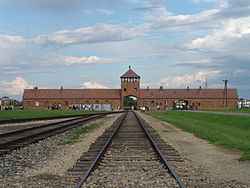Historikerstreit
The Historikerstreit (English: Historians' dispute) was an intellectual and political controversy in West Germany about the way the Holocaust should be interpreted in history. It took place between 1986-1989, and pitted left-wing intellectuals against right-wing intellectuals. Its embers flared up again briefly in 2000[1] when one of the leading figures, Ernst Nolte, was awarded a literary prize. "Die Vergangenheit, die nicht vergehen will" proposed by Ernst Nolte, had to be rejected as inadequate due to their lack of sufficient empirical substance.[2]
Historikerstreit Media
Skulls of Khmer Rouge victims. Nolte's admirer Joachim Fest was to defend Nolte by arguing that Habermas was a racist for arguing that it was natural for Cambodians to practice genocide and unnatural for Germans.
Adolf Hitler. The German historian Heinrich August Winkler wrote: "No German historian has ever accorded Hitler such a sympathetic treatment” as did Nolte.
Related pages
References
- ↑ Cohen, New York Times
- ↑ The past that does not want to pass



